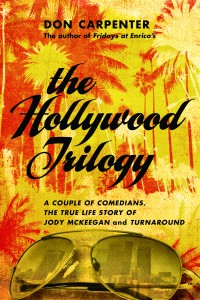Don Carpenter
Don Carpenter was born in Berkeley in 1932. Raised in Portland, he enlisted in the air force and returned to the bay area at the end of his service. He published ten novels during his lifetime, and he had a successful career as a screenwriter, living for long periods in Hollywood. After years of poor health, he committed suicide in Mill Valley in 1995.
Subscribe to our newsletter for news & events from Counterpoint Press.
Books
The Hollywood Trilogy
A Couple of Comedians, The True Story of Jody McKeegan, and Turnaround
Don Carpenter wrote about Hollywood like no one else. Hollywood Trilogy collects, for the first time, Carpenter's most significant Hollywood novels—A Couple of Comedians, The Turnaround and The True Life Story of Jody McKeegan—into a single volume. Here readers will find the jungle of "B" movie Hollywood with no attempt to dress up the rawness and vulgarity of this "glamorous" town. Carpenter's characters occupy every facet of Hollywood—there are naïve and shy young men trying to break into the business, one–picture wonders, comedy duos, beautiful starlets and middle–aged moguls wondering how exactly they got where they are. All are drawn with the wit, pace and above all, the authenticity that were Don Carpenter's trademarks.Following the Spring 2014 publication of Friday at Enrico's, Carpenter's "forgotten" novel, finished and championed by Jonathan Lethem, interest in Carpenter's work is at an all time high. Hollywood Trilogy will introduce readers to an entirely new facet of Carpenter's work, just waiting to be discovered by a contemporary audience.
Fridays At Enrico’s
A Novel
Don Carpenter was one of the finest novelists working in the west. His first novel, A Hard Rain Falling, first published in 1966, has been championed by Richard Price, and George Pelacanos who called it "a masterpiece…the definitive juvenile–delinquency novel and a damning indictment of our criminal justice system," is considered a classic. His novel A Couple of Comedians is thought by some the best novel about Hollywood ever written.He was a close friend of Evan Connell and other San Francisco writers, but his closest friendship was with Richard Brautigan, and when Brautigan killed himself, Carpenter tried for some time to write a biography of his remarkable, deeply troubled friend.
He finally abandoned that in favor of writing a novel. Friday's at Enricos, the story of four writers living in Northern California and Portland during the early, heady days of the Beat scene. A time of youth and opportunity, this story mixes the excitement of beginning with the melancholy of ambition, often thwarted and never satisfied. Loss of innocence is only the first price you pay. These are people, men and women, tender with expectation, at risk and in love, and Carpenter also carefully draws a portrait of these two remarkable places, San Francisco and Portland, in the 50s and early 60s, when the writers and bohemians were busy creating the groundwork for what came to be the counterculture.
A great champion of Don Carpenter, Jonathan Lethem, has taken on the task of editing and developing this last draft into the shape we imagine Carpenter would have himself accomplished had he lived to see this through. And Lethem provides a wonderful introduction to this book, to Carpenter, and to the broad influence of his work which resonates until this very day.

Catapult | Counterpoint | Soft Skull
20 Jay Street #704
Brooklyn, NY 11201
646.926.0805 | contact@catapult.co






